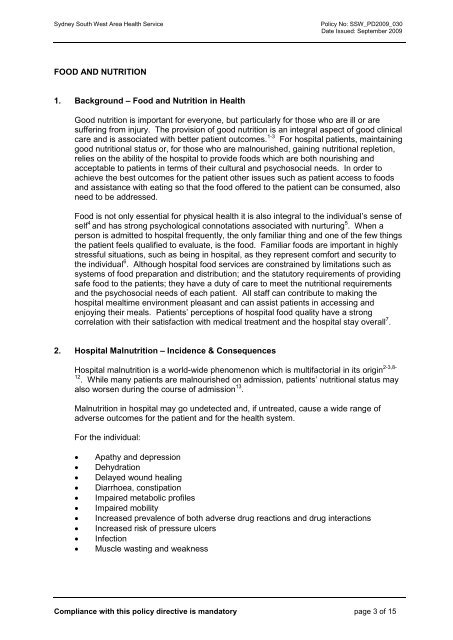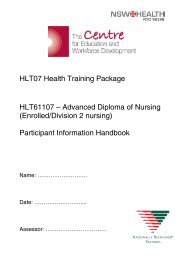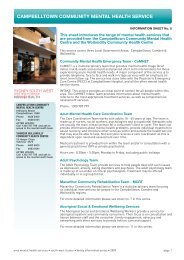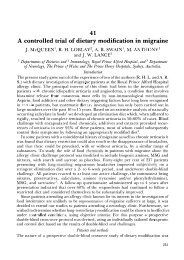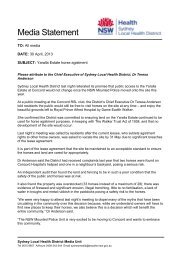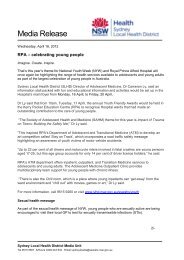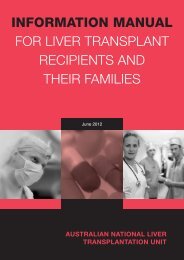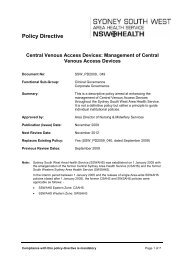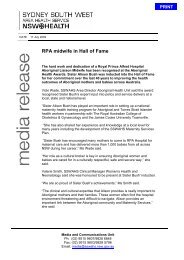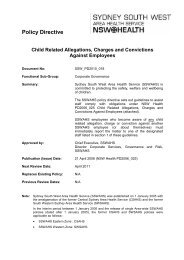Food and Nutrition - Sydney South West Area Health Service
Food and Nutrition - Sydney South West Area Health Service
Food and Nutrition - Sydney South West Area Health Service
You also want an ePaper? Increase the reach of your titles
YUMPU automatically turns print PDFs into web optimized ePapers that Google loves.
<strong>Sydney</strong> <strong>South</strong> <strong>West</strong> <strong>Area</strong> <strong>Health</strong> <strong>Service</strong>Policy No: SSW_PD2009_030Date Issued: September 2009FOOD AND NUTRITION1. Background – <strong>Food</strong> <strong>and</strong> <strong>Nutrition</strong> in <strong>Health</strong>Good nutrition is important for everyone, but particularly for those who are ill or aresuffering from injury. The provision of good nutrition is an integral aspect of good clinicalcare <strong>and</strong> is associated with better patient outcomes. 1-3 For hospital patients, maintaininggood nutritional status or, for those who are malnourished, gaining nutritional repletion,relies on the ability of the hospital to provide foods which are both nourishing <strong>and</strong>acceptable to patients in terms of their cultural <strong>and</strong> psychosocial needs. In order toachieve the best outcomes for the patient other issues such as patient access to foods<strong>and</strong> assistance with eating so that the food offered to the patient can be consumed, alsoneed to be addressed.<strong>Food</strong> is not only essential for physical health it is also integral to the individual’s sense ofself 4 <strong>and</strong> has strong psychological connotations associated with nurturing 5 . When aperson is admitted to hospital frequently, the only familiar thing <strong>and</strong> one of the few thingsthe patient feels qualified to evaluate, is the food. Familiar foods are important in highlystressful situations, such as being in hospital, as they represent comfort <strong>and</strong> security tothe individual 6 . Although hospital food services are constrained by limitations such assystems of food preparation <strong>and</strong> distribution; <strong>and</strong> the statutory requirements of providingsafe food to the patients; they have a duty of care to meet the nutritional requirements<strong>and</strong> the psychosocial needs of each patient. All staff can contribute to making thehospital mealtime environment pleasant <strong>and</strong> can assist patients in accessing <strong>and</strong>enjoying their meals. Patients’ perceptions of hospital food quality have a strongcorrelation with their satisfaction with medical treatment <strong>and</strong> the hospital stay overall 7 .2. Hospital Malnutrition – Incidence & ConsequencesHospital malnutrition is a world-wide phenomenon which is multifactorial in its origin 2-3,8-12 . While many patients are malnourished on admission, patients’ nutritional status mayalso worsen during the course of admission 13 .Malnutrition in hospital may go undetected <strong>and</strong>, if untreated, cause a wide range ofadverse outcomes for the patient <strong>and</strong> for the health system.For the individual:• Apathy <strong>and</strong> depression• Dehydration• Delayed wound healing• Diarrhoea, constipation• Impaired metabolic profiles• Impaired mobility• Increased prevalence of both adverse drug reactions <strong>and</strong> drug interactions• Increased risk of pressure ulcers• Infection• Muscle wasting <strong>and</strong> weaknessCompliance with this policy directive is m<strong>and</strong>atory page 3 of 15


